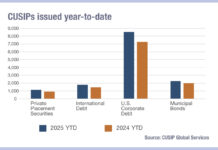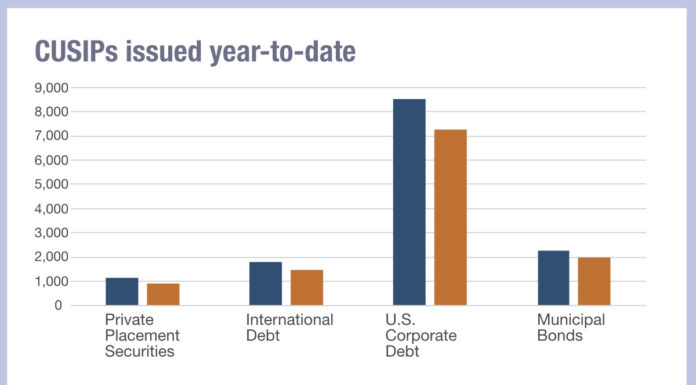Panelists speaking on the All-star Protocol Predictions Panel in Nashville this week agreed that, love it or hate it, the request for quote (RFQ) is here to stay – but urgently needs to evolve. At the same time portfolio trading needs greater investment in infrastructure and streaming still has some way to go. In other news: LTX launches new RFQ+ product, Citadel Securities is entering corporate bonds.
Although e-traded volumes have grown in the corporate bond market in recent years, there are concerns that the electronic execution methods have limits – in particular when it comes to accommodating larger trade sizes, which continue to be traded bilaterally. A 2023 survey from The DESK found that nearly half of mid-market credit asset managers say they never use e-trading for orders between US$5-10m while 64% say they never use e-trading for orders over US$10m. When asked about their most difficult execution objectives, almost 40% said size, while 23% identified both size and price. These issues were at the heart of one panel discussion at FILS US in Nashville this week, which dived deep into the complexities of trading protocols and how they could – and should – evolve.
RFQ: Size matters
“It’s getting harder to get large sizes done,” warned Jim Switzer, global head of fixed income trading at AllianceBernstein. “There are concerns about information leakage, and about the responses we’re getting back. RFQ is here to stay, but the way it’s being used today doesn’t facilitate large trade sizes because people are afraid to show their hand.”
But there are new tools being developed to help deal with these challenges. Jim Kwiatkowski, CEO of LTX, a Broadridge company, revealed onstage that the company had today launched a new enhanced RFQ protocol, RFQ+, combining pre-trade dealer selection analytics with liquidity aggregation capabilities to facilitate larger trades by aggregating multiple dealer responses. Developed following client feedback, the tool is designed to meet exactly these concerns.
“It uses data science to help the buy-side identify which dealers they should use for the trade,” explained Kwiatkowski. “It’s had a very good response, and we’ve already incorporated it into BondGPT [LTX’s large language model].”
Kate Karimson, CCO at LedgerEdge, agreed that technology is taking things in an exciting new direction – but warned that right now it still cannot replace the human touch.
“The main theme for me is that there is so much more to do,” she said. “There is so much more progress to be made when it comes to electronic trading – this is not the end of the road. Why is there still a gap, why are so many trades still going through by voice? Technology is a great enabler but it still can’t replicate that human wisdom and experience. RFQ is not sophisticated enough yet to capture the nuances of the market – but I think it’s at an inflection point, which makes this a really exciting time. It will be interesting to see if RFQ is as dominant in five years’ time.”
This is especially true given that all other protocols out there rapidly evolving to expand the trader toolkit.
“RFQ is the primary tool and it’s here to stay, but it has peaked,” said Russell Budnick, global head of cross-asset trading at JP Morgan Global Wealth Management. “As we get more tools, I think we’ll see more bilateral trading, and more portfolio trading, among other things.”
Portfolio trading: The importance of infrastructure
Portfolio trading is of course another hot topic for fixed income – and according to Will Boekman, head of fixed income sales at Citadel Securities, it’s an area ripe for disruption.
“Portfolio trading is around 6% of the market now, up from basically zero a few years ago,” he said. “There are five or six banks already active, but the buy-side needs a new player in the space. It’s about trust, and knowing who is on the other side – they don’t just want the black box best price. But the proof of concept has been there for a while now, and I think it will be in double digits in a year or two.”
“Portfolio trading in credit will continue to grow,” agreed Leland Clemons, CEO and co-founder of BondBloxx. “And portfolio trading and ETFs are of course linked. There needs to be more connectivity between dealers and liquidity makers to provide liquidity to institutional investors, but it could be 15-17% in the next few years, particularly the more liquid elements.”
Streaming: Still some way to go
But not all protocols are created equal, and some are significantly further advanced than others. Panellists agreed that especially when it comes to corporate bonds, streaming still has a long way to go, with far more sophistication needed to see it really take off – in terms of tiers, customer profiles, and data. And given the cost, venues have a role to play.
“For streaming to be taken up, it needs to emulate other asset classes,” said Kwiatkowski. “On a trader desktop, a large number of bilateral connections is expensive. As that infrastructure builds, service providers need to come in to gather streams from different places and consolidate them. We need more infrastructure and that’s what is slowing things down.”
That’s where resources can become an issue. “Many buy-side firms just don’t have the tech, and budgets are being cut, cost pressures are going up – there need to be solutions developed that enable other people to join the party,” said Karimson.
One of those planning to join the party, it turns out, is Citadel Securities, whose head of fixed income sales Will Boekman revealed that the firm has plans to enter the corporate bond space to help liquidity improve – of which more later, so watch this space.
To finish the discussion, the panellists discussed how the usage of these different protocols might be combined to achieve greater efficiency. Interoperability has been a key theme running through the conference this year, but there could be a new buzzword in town.
“My prediction is that there will grow to be more interconnectivity between protocols,” concluded Clemons.
The DESK
©Markets Media Europe 2023
©Markets Media Europe 2025


























